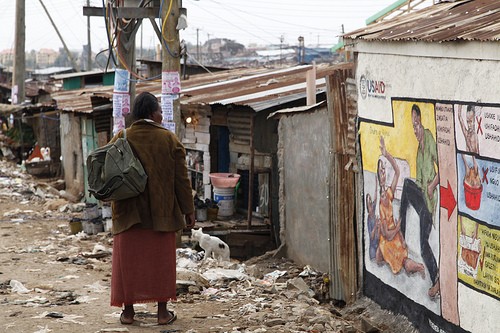Kenya
 This colorful mural - located in Kibera, an informal settlement of Nairobi - illustrates the steps a woman should take if she has experienced sexual or gender-based violence.
USAID Kenya
|
Gender-based violence (GBV) remains an area of significant concern in Kenya. Historically, both women and children have borne the brunt of cultural ideas and practices that perpetuate sexual and gender-based violence. Such situations affect women and girls in negative ways, and impede their ability to contribute to the progress of the country.
About 45 percent of women between the ages of 15 and 49 have experienced physical or sexual violence. Many survivors have limited access to appropriate services. For this reason and many others, incidences of gender-based violence – against both men and women – remain under-reported.
A rise in gender-based violence was reported before, during and after the 2007 general elections. USAID focused on preventing such situations in the run-up to the 2013 elections. Our partners created a more protective and peaceful environment by linking emerging grassroots movements to higher level peace initiatives. Through these networks USAID:
- Provided training to police officers on how to deal with cases of gender-based violence;
- Incorporated gender-based violence warnings into national early warning systems;
- Promoted the safety and security of women through media campaigns; and
- Launched a toll-free National Gender-based Violence Hotline.
Today, Kenya is embarking on a new structure that fundamentally changes the way government works and relates to the people. This approach, known as devolution, is forming 47 new county governments; redefining the national government; and getting the national and county governments to work in tandem for the betterment of Kenya. Under devolution, many of the services needed to assist survivors will be available at the county level.
USAID will continue to address gender-based violence and provide awareness, safe spaces and treatment for survivors. Delivered through local governments, health facilities and in the community, these services will:
- Increase survivors’ access to quality medical, legal and psychosocial services;
- Support the Government of Kenya in establishing “one-stop shops” where all services are provided in one place;
- Mobilize communities to address the underlying causes of violence;
- Coordinate a more effective response through stronger national and local networks;
- Increase legal accountability for sexual and gender-based violence; and
- Encourage Kenyans, especially men, to speak out and take action.
Related Areas
Gender Equality and Women’s Empowerment








Comment
Make a general inquiry or suggest an improvement.